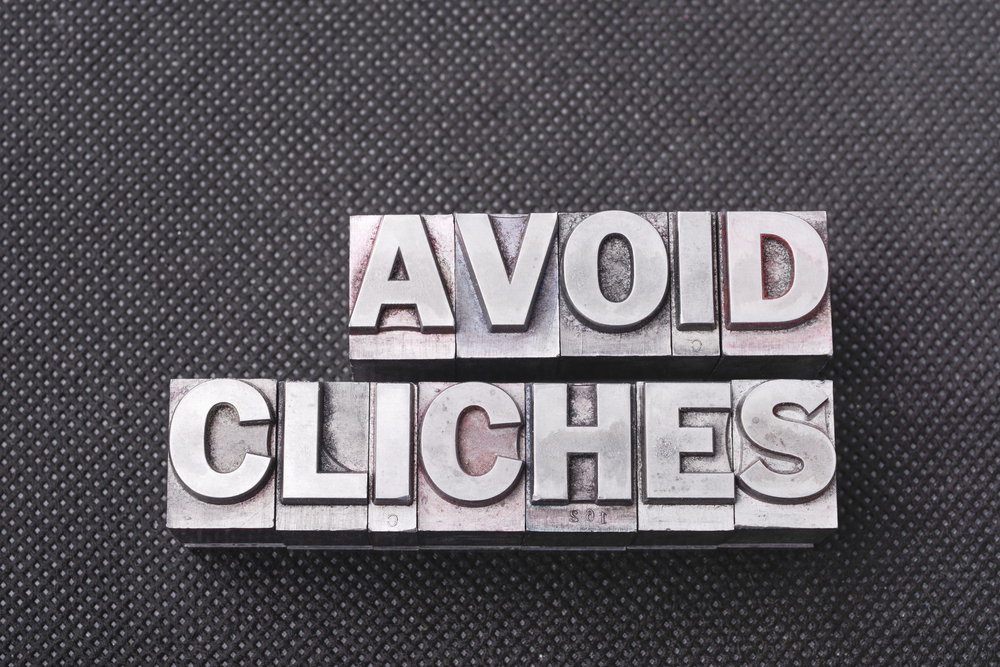What were the last three texts you sent to your friends? Or, what texts did you share on your Facebook page? Let’s guess:
- The texts contained new information for you.
- The language was capacious, figurative, concrete and, probably, with well-aimed and biting humor.
- The articles aroused emotions, grabbed your attention from the first sentence, and kept it to the last one.
We are 99% sure that these texts did NOT begin with the words “It’s not a secret to anyone,” “Everyone knows,” or “As they say.” These materials did NOT contain a “flexible discount system,” “guaranteed result,” “market leader,” or “professional team.”
So why are thousands of texts teeming with such dead phrases? Let’s talk about cliches in texts: where they came from, and how to avoid chiches in texts.
What Are Cliches in Writing?
Initially, the concept of “cliche” refers to the field of printing. A cliche in speech was defined as a replica, or speech that is always the same. In addition to this, this concept is also of literary origin. For example, a metaphor, once original, can become a cliche (an overused formula, starting from the moment it is repeated and disappearing from constant use, such as “to kill time”).
“Cliche” is a figurative word or expression that is repeated without thinking about the meaning. There are two types of metaphors according to their degree of originality: cliche metaphors and stock metaphors. The difference between the two types of metaphors is that stock metaphors have not yet become outdated (a ray of hope), while cliche metaphors have already become stereotyped due to overuse (green with envy, a heart of stone).
Many researchers also distinguish “situational cliches” as a separate cliche group. The term “situational cliche” corresponds to the terms “set expression,” “set phrase,” and “colloquial expression.” Cliches of this type appear in the specific conditions of a speech act and in typical situations (“Good night!” “What a surprise!”).
Common Cliches in Writing
Of course, there are lots of cliches, and we won’t include all of them here, but we will give you examples of cliches to make you understand what we are talking about.
- Think outside the box.
- Cold as ice.
- A perfect storm.
- What goes around comes around.
- Plenty of fish in the sea.
- Beating a dead horse.
How to Avoid Cliches in Writing
One of the most effective ways to deal with cliches is to be more specific. After all, a cliche is a void, which means that a void must be filled. The paradoxical advice to not speak beautifully is fully applicable in the fight against cliches. Often firemen are just firemen, not fire fighters, and doctors are doctors, not people in white coats.
Cliches and catchphrases will not make a speech figurative – they will only cause bewilderment and irritation. Expressing lively feelings in living words that come right from the heart is perhaps the best advice that can be given to anyone who wants to speak competently and beautifully. Here are also some tips of writing clichés to avoid:
Be alert!
Re-read what you’ve written, thinking: have you seen these “figurative” and “reinforcing” expressions before? Could it be clearer? And shorter?
Train your imagination
Create fresh and original images yourself. This is not so difficult, because you can use any item, any character, any fictitious situation. Cold as ice could be: Cold like chicken in a freezer, or like the silence of an iceberg.
Keep the words
Speak and write only when you know exactly what you want to convey to other people. First you need to think, then express.
Cliches are not evil, but evil is carelessness when dealing with them. It is impossible to get rid of them completely, but you need to strive for it. You should minimize the use of cliches in your text to make it more interesting and diverse.
Students regularly find themselves in situations where they need to show the best writing skills, but they can’t do it. If you use WritingCheap in such a situation, such decisions will make you a winner. We appreciate our customers, and we are ready to help them with any task!
